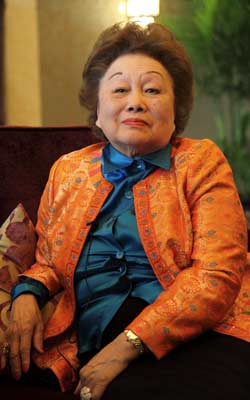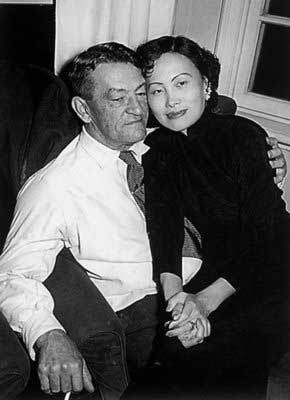Anna Chan
A legend in the Chinese community, Anna is famous for many reasons. She was the wife of "Flying Tigers" leader General Claire Chennault, the first female reporter for the Central News Agency, and the first person of Chinese ancestry who have had a successful political career in the United States, where she became known as "the hostess of Washington."
Often acting as a "secret ambassador," she served as an emissary for interactions among the Chinese mainland, Taiwan and U.S. Over the past eight decades, she has devoted all her life to promoting dialogue and exchange between the two sides of the Pacific Ocean. She has published an autobiography and several collections of writings. Numerous TV serials based on her life have been produced and broadcast in Taiwan and the mainland.
Born into a well educated family in Beijing on Jun. 23, 1925, Anna was the most opinionated and stubborn of the siblings. In 1939, WWII broke out, the world was in chaos, and China was battling the Japanese Fascists. Anna's father, a diplomat, wanted to send his children to study abroad, but Anna refused. Instead, she led a nomadic student life, attending middle school in Hong Kong and Lingnan University in Guangdong Province.
She recalled that life was extremely hard during the Anti-Japanese War. "There was no electric light for studying, no hot water for bathing. People couldn't even get one meal with meat per week," she said. But even under such harsh conditions she never quit studying.
In 1944, Anna graduated from Lingnan University with a degree in Chinese. She began her career as a journalist, serving as a war correspondent for the Central News Agency from 1944 to 1948 and a feature writer for the Hsin Ming Daily News in Shanghai from 1944 to 1949.
"At that time, I was so young and full of passion and enthusiasm. I wanted to be a journalist, to report the real China to the whole world," she told China.org.cn. "It was a tough but amazing experience that I was able to interview common people and write about the war."
In 1946, Anna met her future husband General Claire Chennault, who was a major war hero in China. The Flying Tigers squadron that Chennault trained made him immensely popular among Chinese servicemen and civilians alike. In 1947, Anna married Chennault, who was 32 years her senior. Their love story has moved generations of Chinese people.
But Chennault died of lung cancer in 1958. Although they only spent 11 years together, Anna cherishes that period as the most precious time in her life. She said she would never remarry again as there was no room in her heart for anyone but her husband.
"A person always needs love. The 11 years of the marriage with General Chennault was the most precious time in my life. Though he left us a long time ago, I still miss him," she said.
Anna visits the Chennault's grave to mourn him every Veteran's Day with his friends and colleagues. She has planted a jequirity tree at the tomb, a symbol of lovesickness in China.
In 1949, she left for Taiwan with her husband. But in July 1958 came the black day when Chennault died of lung cancer.
A strong woman, the death of her husband did not slow Anna's career. After his death, Anna settled in the U.S. with their two children. She received an honorary Doctor of Literature Degree from Chungang in Seoul, Korea in 1967, and an honorary degree at Lincoln University in San Francisco.
Anna took a variety of jobs - becoming chief of the Chinese section of the machine translation research department at Georgetown University, a broadcaster for the Voice of America, a lecturer, a writer, a fashion designer, and one of the key executives of Flying Tiger Line for which she handled many contract negotiations.
She was very active in Republican Party affairs, with posts including co-chairwoman of the Republican National Committee's Finance Committee (1966-1983) and was twice chairwoman of the National Republican Heritage Groups Council.
Because she helped a number of Republican presidential candidates in elections, she gained the trust of the White House. Presidents Kennedy, Johnson, Nixon, Ford, Carter, and Reagan all asked her to take on various informal tasks for them. In 1963, President Kennedy named her the chairman of the Chinese Refugees Relief Committee, making her the first person of Chinese ancestry to be appointed to the White House staff.
Her hard work has been recognized by the international community. In 1966, she won the Freedom Award of the Order of Lafayette and the Freedom Award from the Free China Association; in 1971 she received the Award of Honor from the Chinese-American Alliance.
As Anna became increasingly prominent in mainstream political activities and gradually built up her status in social circles, she came to be known in the U.S. capital as "the hostess of Washington."
In the early 1980s, as the Chinese mainland began to implement its opening-up and reform policy, she naturally served as an envoy between the three points of the triangle – the mainland, Taiwan and the U.S. In 1980, shortly after Ronald Reagan's presidential election victory, she was sent to Beijing as a special ambassador to meet with Deng Xiaoping.
Today Anna visits the mainland frequently and is an active player in promoting cultural exchanges between China and the U.S., as well as across the Strait.
In 1981, she established the Chen Hsiang-mei Education Prize in more than a dozen cities in the mainland in order to encourage outstanding teachers. The "Chen Hsiang-mei Scholarship," which includes a stipend of $2000, is awarded each spring to persons majoring in Chinese. Each year she travels to various cities to present the award.
Besides creating these awards, she has also founded several "Hsiang-mei schools," covering all costs out of her own pocket.
"I'm interested in education; I think it's the foundation of a strong nation," Anna explained. "I just want to do more for my motherland."
She said she was greatly encouraged and helped by her teachers, and that she would never forget them. She was one of initiators of "Teachers' Day" in China.
From northern China to the south, from Taiwan to the U.S., Anna has experienced both bitterness and sweetness. She sees herself as a wonderful combination of identities.
"During the past three decades, the mainland has changed dramatically. Now it's undertaking the development of the northwestern region (including Tibet, Xinjiang, Gansu, Shaanxi, Sichuan and so forth)," she said. "It has made me determined to go to the northwest, which is backward and in need of help."

